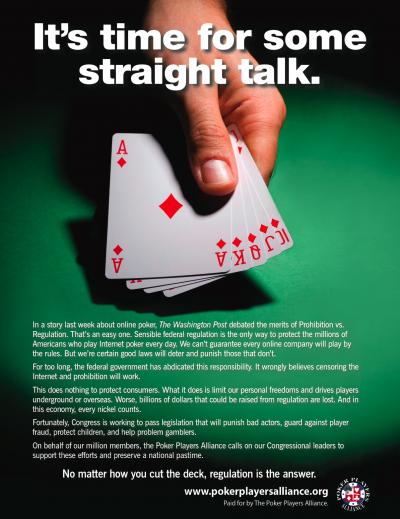






Poker Players Alliance Spreading Word Through Ad CampaignAdvertisements Will Appear in Three Publications in Washington, D.C. |
|
|
 The Poker Players Alliance is launching an ad campaign directed at those who work on Capitol Hill to encourage federal online poker regulation.
The Poker Players Alliance is launching an ad campaign directed at those who work on Capitol Hill to encourage federal online poker regulation.
This week, ads will appear in the three Capitol Hill publications Roll Call, The Politico, and The Hill urging readers to look at online poker regulation as a solution to the problems that were brought up during a recent 60 Minutes broadcast.
The text of the ad pictured at right reads:
In a story last week about online poker, The Washington Post debated the merits of Prohibition vs. Regulation. That’s an easy one. Sensible federal regulation is the only way to protect the millions of Americans who play Internet poker every day.
We can’t guarantee every online company will play by the rules. But we’re certain good laws will deter and punish those that don’t. For too long, the federal government has abdicated this responsibility. It wrongly believes censoring the Internet and prohibition will work. This does nothing to protect consumers. What it does is limit our personal freedoms and drives players underground or overseas. Worse, billions of dollars that could be raised from regulation are lost. And in this economy, every nickel counts.
Fortunately, Congress is working to pass legislation that will punish bad actors, guard against player fraud, protect children, and help problem gamblers.
On behalf of our million members, the Poker Players Alliance calls on our Congressional leaders to support these efforts and preserve a national pastime.
No matter how you cut the deck, regulation is the answer.
Regarding the 60 Minutes story, which told the nation about the cheating scandal that took place on the online poker sites Absolute Poker and UltimateBet, the PPA released this statement featuring PPA Chairman and former Congressman Al D’Amato:
The recent cheating scandals underscore the need for U.S. licensing and regulation of online poker to help protect consumers. While even the most highly regulated industries are susceptible to fraud and abuse, regulation does provide assurances that when consumers are harmed they have recourse, and that the offenders will be sanctioned. The continued pursuit of poker prohibition, on the other hand, will only drive this industry underground. As the Washington Post pointed out, prohibition represents a widening disconnect between 21st-century technology and 20th-century laws.
Regulation of Internet poker does not equal an expansion of gambling in this country. Like it or not, the phenomenon of internet poker cannot be wished away. The American market has spoken. There is strong demand for Internet poker and no reasonable government can or should stand in the way of adults competing in games of skill on the Internet. To the contrary, the government should step up and exercise regulatory oversight on this multi-billion dollar interstate commerce, and collect the revenue—especially during this country's economic crisis.
The federal government cannot continue to abdicate this basic responsibility to the millions of its citizens who choose to play poker on the Internet. The attempt to enforce an outright prohibition of online poker is deeply flawed and unworkable, and it invades upon the personal freedoms of law-abiding adults who wish to engage in a game of skill. And as 60 Minutes and the Washington Post stories reported it also exposes American consumers to the rare, unscrupulous bad apple operator who will take advantage of the lack of a U.S. regulated marketplace.
Now more than ever the U.S. Congress needs to step up and enact real public policy as it relates to Internet gaming. We look forward to working with the new Administration and the new Congress to advance sensible regulatory solutions such as those introduced in the 110th Congress by Representatives Barney Frank (H.R. 2046) and Robert Wexler (H.R. 2610) and Senator Robert Menendez (S.3616).
